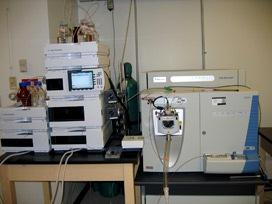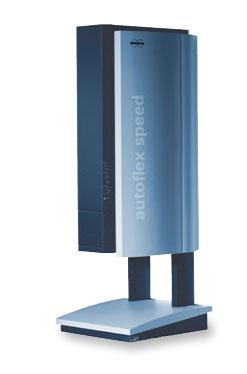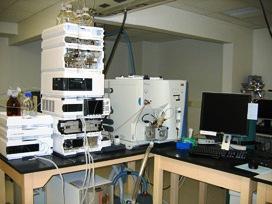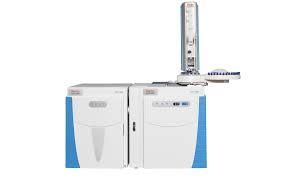The Proteomics Core is a research facility providing a wide range of mass spectrometry services.
The Facility has four mass spectrometers operating in different ionization modes (EI, APCI, ESI, MALDI) allowing for qualitative and quantitative analyses of a wide variety of compounds (gases, liquids, solids) of various volatility, polarity, and molecular weights in the same laboratory setting. Some systems are coupled with chromatographic modules providing efficient separation of mixtures before mass spectrometric analyses. The Core supports a wide range of projects in areas of proteomics, genomics, carbohydrate chemistry, metabolomics, drug discovery and delivery, material science (polymers, organometallics), analyses of natural products, and environmental pollutants.
Proteomics analyses include protein molecular weight determination, protein identification and sequencing, studies of post translational modifications, folding/unfolding of proteins, protein-protein and protein-ligand interactions. Bruker Autoflex Speed MALDI TOF-TOF and Thermo TSQ Orbitrap XL mass spectrometers are the major tools in solving these problems. The Core has access to various data base search platforms and protein identification software.
Thermo TSQ Quantum triple-quadrupole mass spectrometer is the main instrument for targeted quantitative analyses. Selected and Multiple Reaction Monitoring are the most common modes of this instrument, providing enhanced sensitivity and selectivity on measurements of a variety of analytes including drugs, sugars, polysulfated GAGs, antibiotics, alkaloids, natural products, environmental pollutants.
The characterization of polymers including molecular weight distribution and end group determination as well analyses of synthetic polyaminoacid oligomers can be performed on the MALDI instrument.
Volatile compounds and compound mixtures can be successfully analyzed on Shimadzu GCMS mass spectrometer which is used to characterize solvents purity, some drugs, terpenes, alkaloids, essential oils.
The Facility is directed by Dr. Ke Xia, an experienced research scientist who is the author of more than 60 research papers, reviews, chapters in books and innovations who conducts the research, performs analyses and provides hands-on training for users.
Contact Information:
Ke Xia, Ph.D.
Proteomics Core Director
518-276-2149
xiak@rpi.edu
Training
All users must receive proper training before being permitted access to the equipment. Training is provided by the Core Director. The length of the training depends on the type of the instrument and varies with the trainee’s prior experience on the equipment. Training is available for RPI and external users.
Online Scheduling
Advance reservation using iLab online scheduling calendar is required. The billing is based on the length of occupation time, which is calculated based on the equipment log records.
To schedule time in the facility:
- Click on this https://rpi.corefacilities.org/account/login link to open the iLab website in a new window.
- Click the ‘Login’ button on the site allows you to enter your RCS username and password.
- Please avoid scheduling time that you will not use and try to cancel reservations that you cannot make as soon as possible.
- It is advised that experiments requiring long time to be performed overnight or on weekends.
Log Book
Each instrument has a logbook. The logbook must be used to record the actual start and end time for each session and any problems encountered during the session.
Technology





Obtain high confidence insights for very complex molecules with the Thermo Scientific™ Orbitrap Eclipse™ Tribrid™ mass spectrometer.
